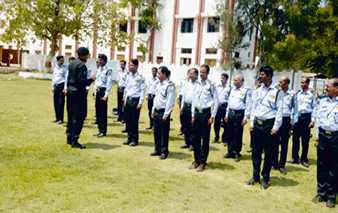At UCS we start as we mean to go on. Every Security Officer's carrier begins with a threepart
induction.




Duties and responsibilities of a Security guard
- Patrolling
- Access control
- Searching
- Security and emergency systems Fire awareness and dealing with emergencies Health and safety at work
- The law, crime scene preservation and evidence
- Customer care skills
- Communication skills and reporting
- Avoiding conflict and reducing risk (role play scenario)
- Defusing conflict (role play scenario)
- Resolving conflict
- Post incident considerations and learning from conflict
Part 2 – Site Specific Training
Once assigned to a contract, Security guards undergo specific training. Tailored to the needs of the contract and the client's Assignment Instructions, training covers areas such as :- Customer care
- Assignment security duties
- Appearance, attitude and conduct
- Legal restriction on arrest, search and seizure
Control Room Operations Safe Child lost child procedure This training is normally carried out on site, at the end of which Security Officers will be tested. The Operations Manager will ensure that all Security guards have passed the Site Specific Training Programme.


Part 3 – Continuation Training
A significant percentage of ucs Security Management Team have been promoted from within the business. UCS ongoing development programme ensures that staff maintain the highest standards and deep abreast of technological advancements, industry best practice and any changes to regulatory or contract requirements. When designing development programmes, input is encouraged from the client by UCS. Operational Managers. Continuation Training will include :Assignment Training to prepare personnel for specific duties. Client and site requirements will determine the subject matter and the duration of training.
Site Refresher Training carried out by the Operational Supervisors or by the field officer as necessary to ensure compliance with client and site requirements.
A personal training file is maintained on all Security Officers and these are available to our clients at any time.
Advance Training –
After selection the Guards & Supervisors are thoroughly trained in the following areas-- General surveillance & vigilance duties.
- Maintenance and upkeep of registers & records.
- This is client specific.
- Fact finding & Reporting.
- Soft-skills
- Communication skills. Recording data of emergency equipment as may be required by the client. Fire-Fighting assistance
- Disaster Management / Emergency / response measures
MODULE – INDUSTRIAL SECURITY GUARD
Indoor Training
- Perimeter Security.
- Access Regulation.
- Record keeping and Document Scrutiny.
- Handling Industrial Unrest.
- Pre-emptive Security from Hazardous Industrial Operations and Substances.
- Preventive and Combative Standard Operating Procedures related to Industrial Security.
- Periodic Operational Security Audit.
- Duty Shift Management and Prioritization of Security Imperatives in accordance with Time Considerations.
- Special Anti-sabotage and Cargo checking operations related to industrial Security.
- Contingency-management with special reference to Industrial Security.
- Handling, Operation and Maintenance of Gadgetry and Surveillance Systems used for Industrial Security.
- Monitoring and Surveillance to safeguard Vital Installations/Industries from Subversion and Sabotage.

Outdoor Training
- Physical Fitness Exercises.
- Endurance Practice.
- Proper Wearing of Dress.
- Saluting/Greeting.
- Proper Body Movements and Basics of Marching.
- Un-armed Combat.
- Fundamentals of Security Skills/Practices: (Practical Field Demonstrations).
- Access Control/Frisking.
- Anti-sabotage Checking.
- Cordoning and Sealing.
- Surveillance.
- Body Search. Premises Search and Area Search.
- Handling and Operating Basic Fire-fighting Equipments.
- Close quarter combat Techniques.
- Cordoning and Providing Security Cover to a Threatened Person in Crowded Places.
- Handling and Operation of Wireless Communication Equipments.











